Coronavirus (COVID-19) Updates
For the latest COVID-19 information and updates from Qatar Foundation, please visit our Statements page

Non-native Arabic speakers highlight different ways in which debating has helped them learn the Arabic language
Research shows that debating is an effective way to learn a language, because instead of being bogged down in the minutiae of language rules, the focus is placed on articulating ideas.
“I have taught Arabic for about twenty years now and there are many approaches to teaching I have tried over the years. I can say with confidence that debating is one of the most wholesome and enjoyable ways to learn any language. It is a brilliant multi-dimensional teaching tool that deserves to be used more,” said Noha Forster, Associate Senior Instructional Professor & Director of Arabic Language at the University of Chicago.
Forster is originally from Egypt but has spent most of her life in the US. She holds an M.A in Near and Middle Eastern Studies from Princeton University and has been teaching Arabic at the University of Chicago since 2002.
I remember the first time I was at a QatarDebate event back in 2018. The energy was just different, and the way it had the students engaged was so refreshing to see as a teacher
Forster started using debating as a teaching tool after an encounter with QatarDebate. She said: “I remember the first time I was at a QatarDebate event back in 2018. The energy was just different, and the way it had the students engaged was so refreshing to see as a teacher.”
She was so impressed that she immediately decided she was going to incorporate debating in the Arabic program she teaches, and she did. “I built a course around debating called ‘Arabic through Debate’, and it’s the first time that we used debating as part of a course in our department.”
The course has been very well-received by students at University of Chicago. She added that while some of the students are initially a little wary of it, particularly the shy ones, by the end of the course they are always amazed at their own progress, especially their newfound confidence in speaking the language.
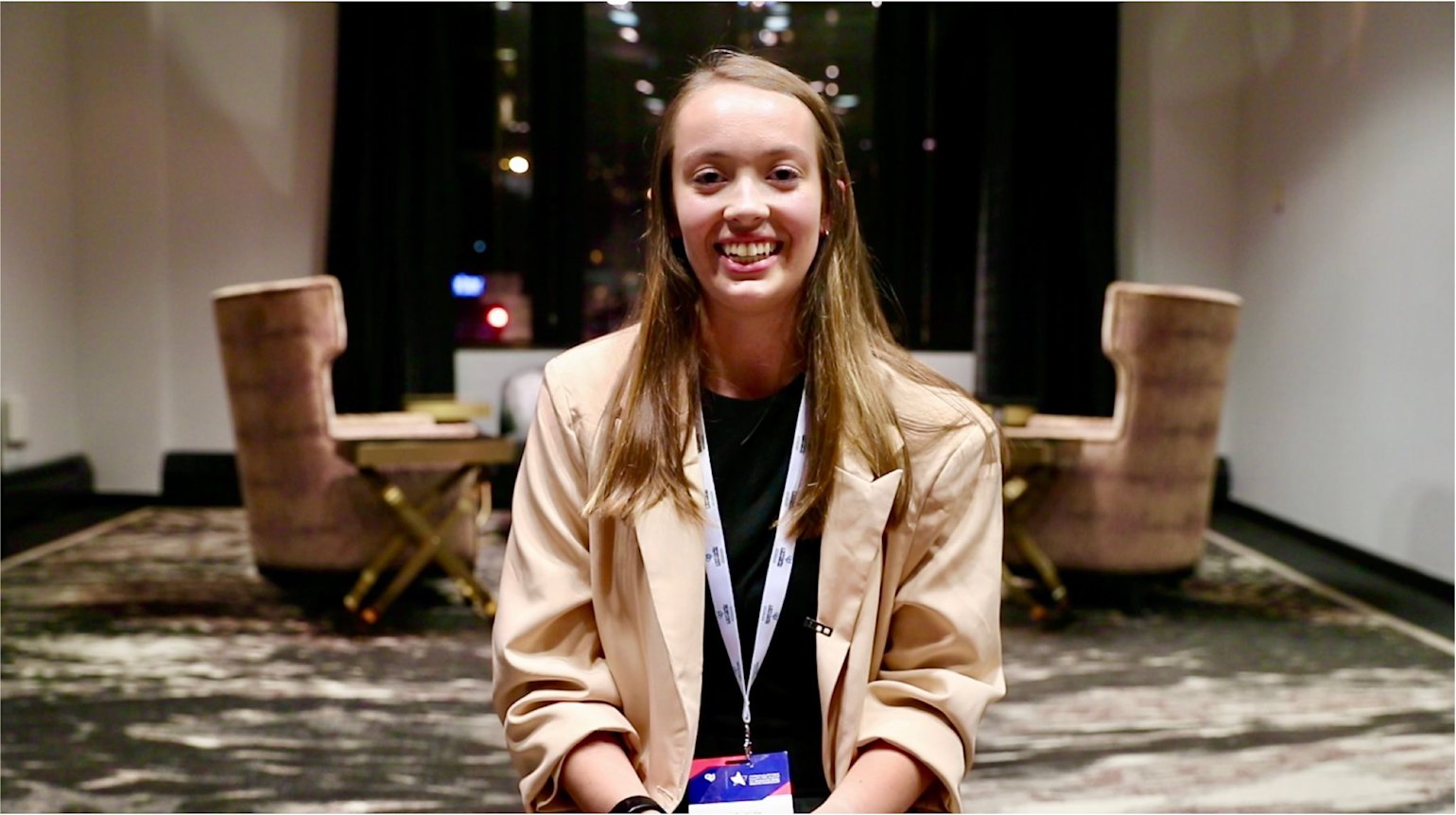
Madeline Grasso.
She explained that the biggest hurdles that people face when learning a new language are lack of confidence and fluency in speaking.
“I think one of the reasons debating works so well in helping people overcome their speech anxiety is that debating topics either challenge the participant’s intellectually or morally, for example, animal testing.”
According to Forster, human nature is such that once the conscience gets involved, everything else takes a back seat. “Students forget that their Arabic is not perfect, instead they find themselves focusing on just getting their point across in the most articulate manner possible using the vocabulary they have.”
I learned more in the two months preceding the 2nd QatarDebates U.S. Universities Arabic Debating Championship (USADC) than I did in the past two years learning Arabic in a classroom setting
Forster describes her personal experience of using debating as a tool for teaching language, inspired by QatarDebate, a “phenomenal success!”
For 20-year-old Madeline Grasso from the University of North Georgia, her experience of learning Arabic through debating is best described as “learning on steroids”.
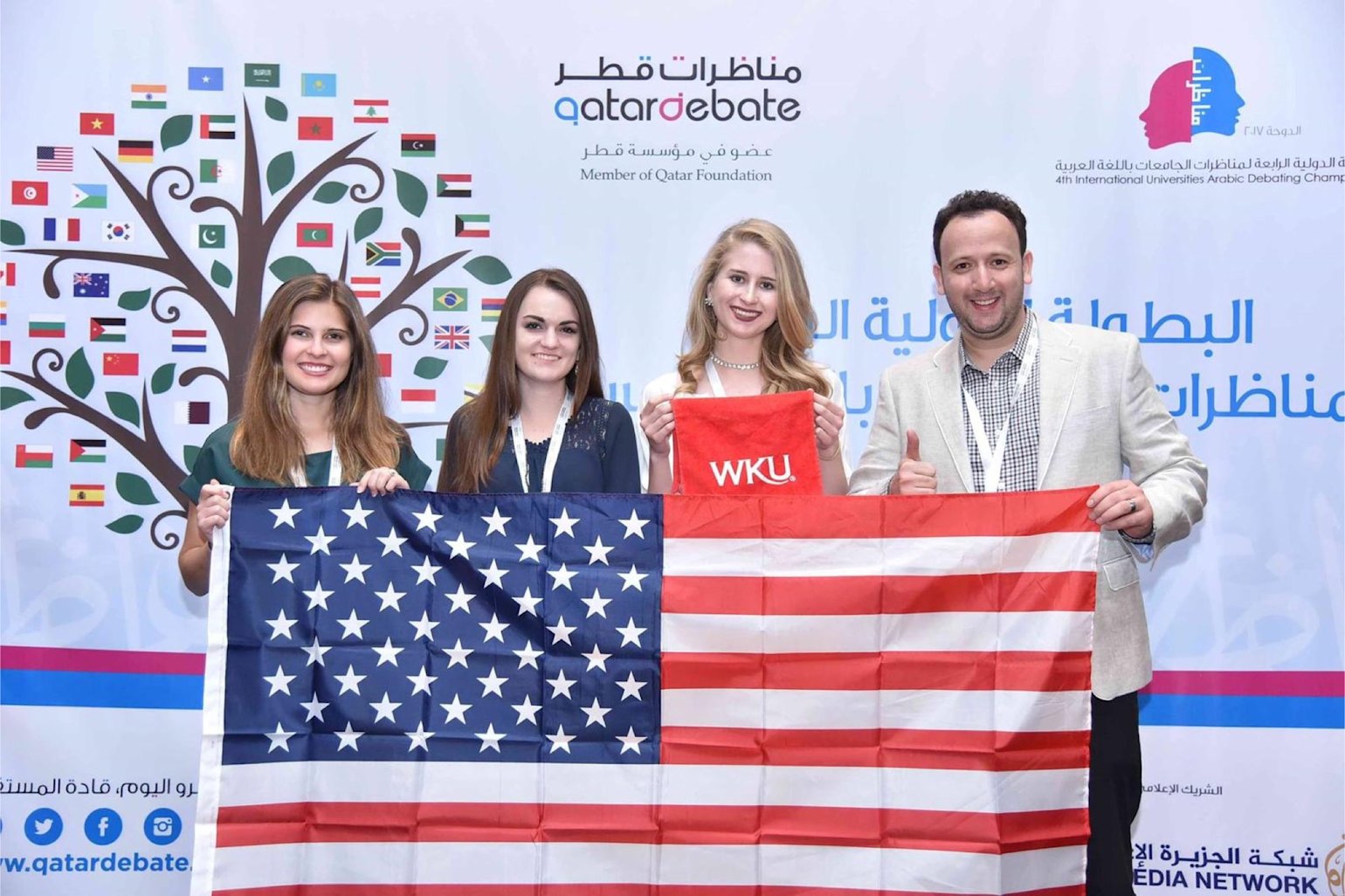
Mollie Todd (second from left).
“I learned more in the two months preceding the 2nd QatarDebates U.S. Universities Arabic Debating Championship (USADC) than I did in the past two years learning Arabic in a classroom setting,” said Grasso.
The area she found herself improve in most is vocabulary. “Because we don’t know what topics we will be debating about until half an hour before the debate, means we have to be prepared for everything, and that means learning words about topics that I wouldn’t normally do.”
In classes, I read and I write and I speak but it’s in a fragmented manner, whereas debating requires that I do all of that together and accomplish something outside the classroom which is a unique opportunity when learning a second language in a country to which it is not native
For 26-year-old Mollie Todd, who grew up in a small town called Flemingsburg in Western Kentucky, debating was her only opportunity to speak Arabic outside the classroom and one that she says she “massively” benefitted from.
“Simple way to put it is, before debating at the USADC, on a scale of 1-10, I would have rated my spoken Arabic at a five out of ten, but thanks to debating, today I would rate myself a solid eight out of ten, maybe even a nine!”
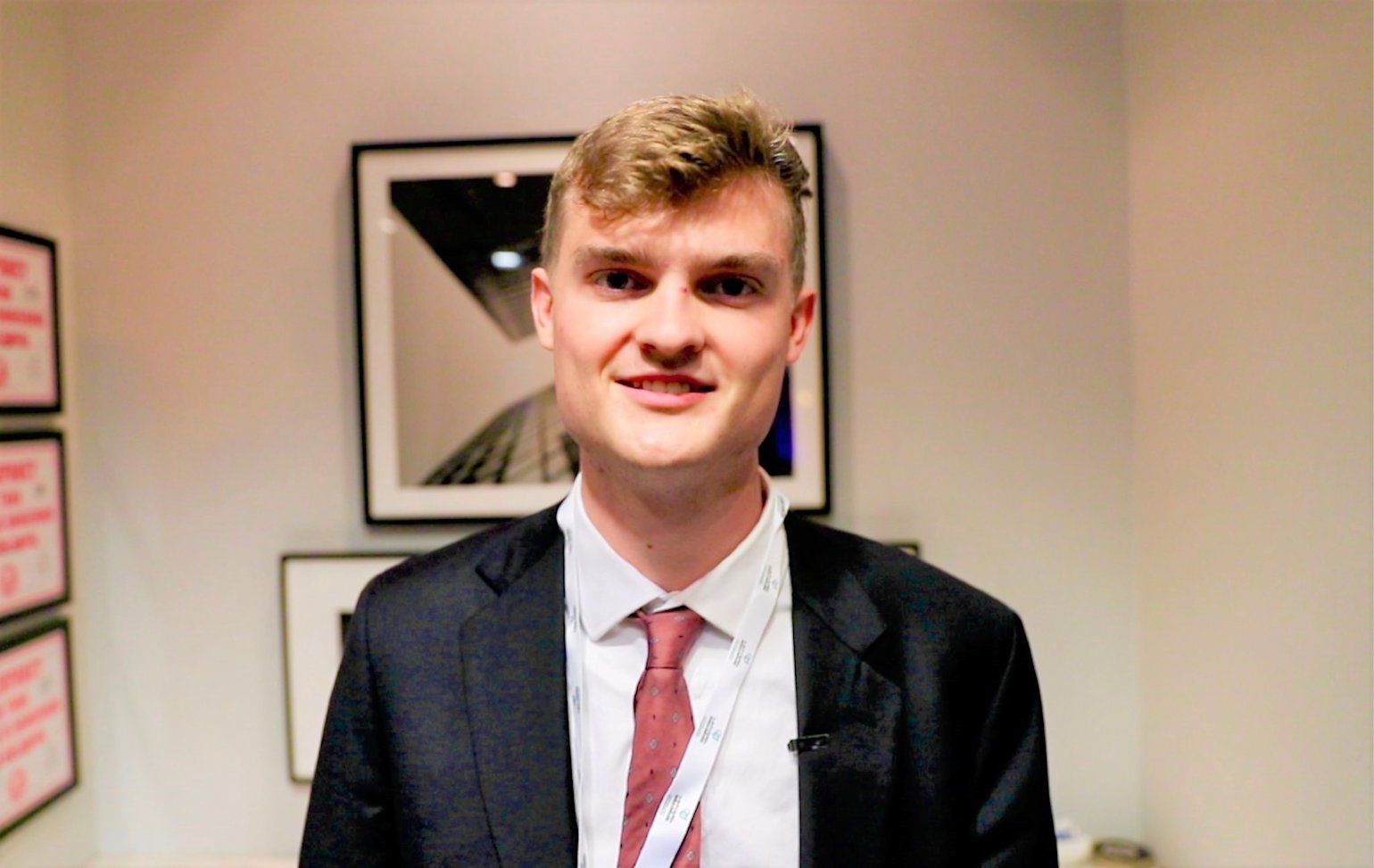
Caleb King.
Todd currently works for the federal government of the United States where her Arabic skills come in handy every once in a while.
“Debating worked wonders for my confidence when it came to speaking the language. As a non-native speaker, the fact that I was able to continuously speak for seven minutes – while debating – was the biggest confidence booster ever. Previously, I often found myself questioning my Arabic skills, but after debating, particularly with native speakers, I felt this sense of validation that yes, I do actually know the language to a level where I can get my point across in it.”
Another life-lesson she learned through debating in a foreign language is perseverance. “I feel like if I, as an American with absolutely no obvious connection to Arabic, can learn it to the level that I have, then I can do anything, and that the sky is the limit, really!”
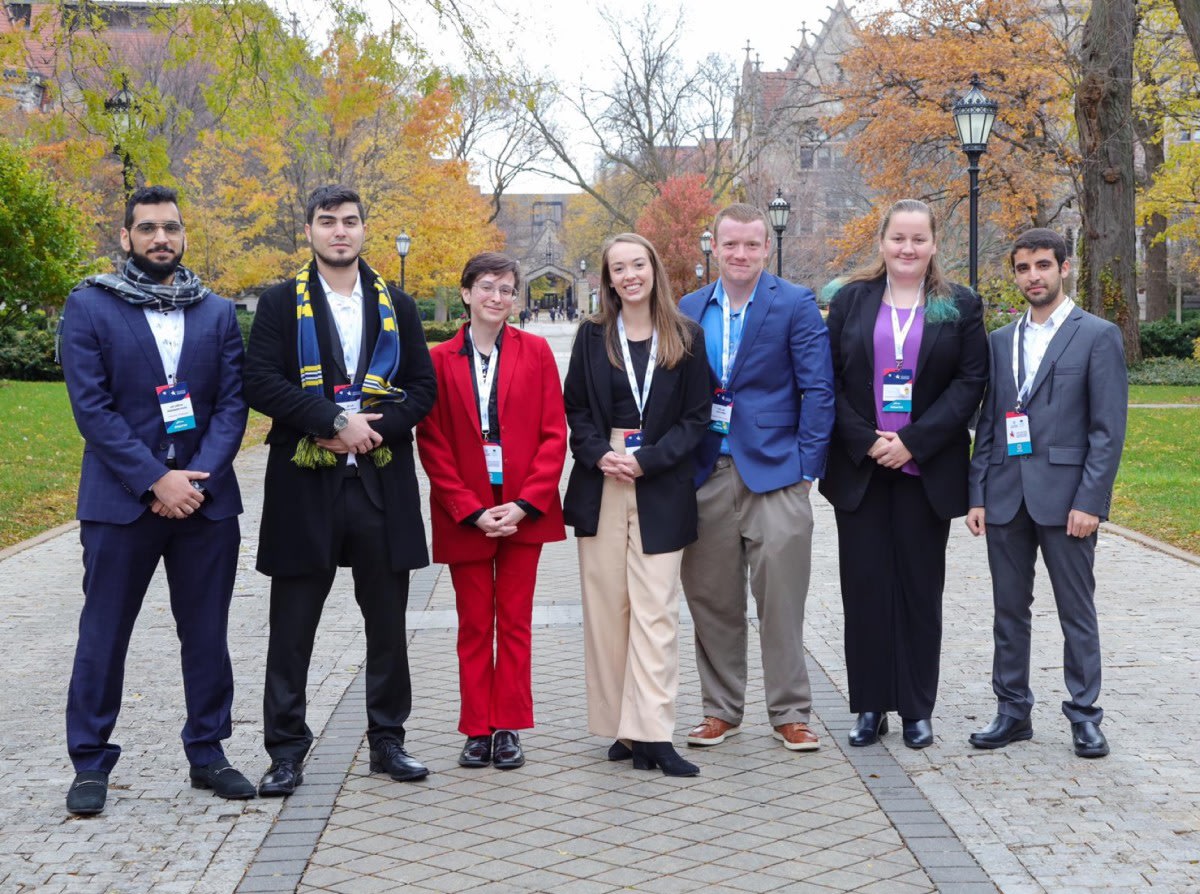
Madeline (center) along with other participants at the 2nd US Universities Arabic Debating Championship.
For 22-year-old Caleb King who is a junior studying Near Eastern Languages and Civilizations at Harvard University, debating gives him an opportunity to combine everything he learns in Arabic class and put that to use outside the classroom.
Debating worked wonders for my confidence when it came to speaking the language. As a non-native speaker, the fact that I was able to continuously speak for seven minutes – while debating – was the biggest confidence booster ever
Before starting university, King spent a year in Egypt which gave him the opportunity to study and speak Arabic on a daily basis. “When I came back, I had no idea how I was going to continue learning Arabic. In my freshman year, I found out about QatarDebate and it presented the perfect opportunity to continue learning Arabic in a way that is more hands on than conventional classroom learning.
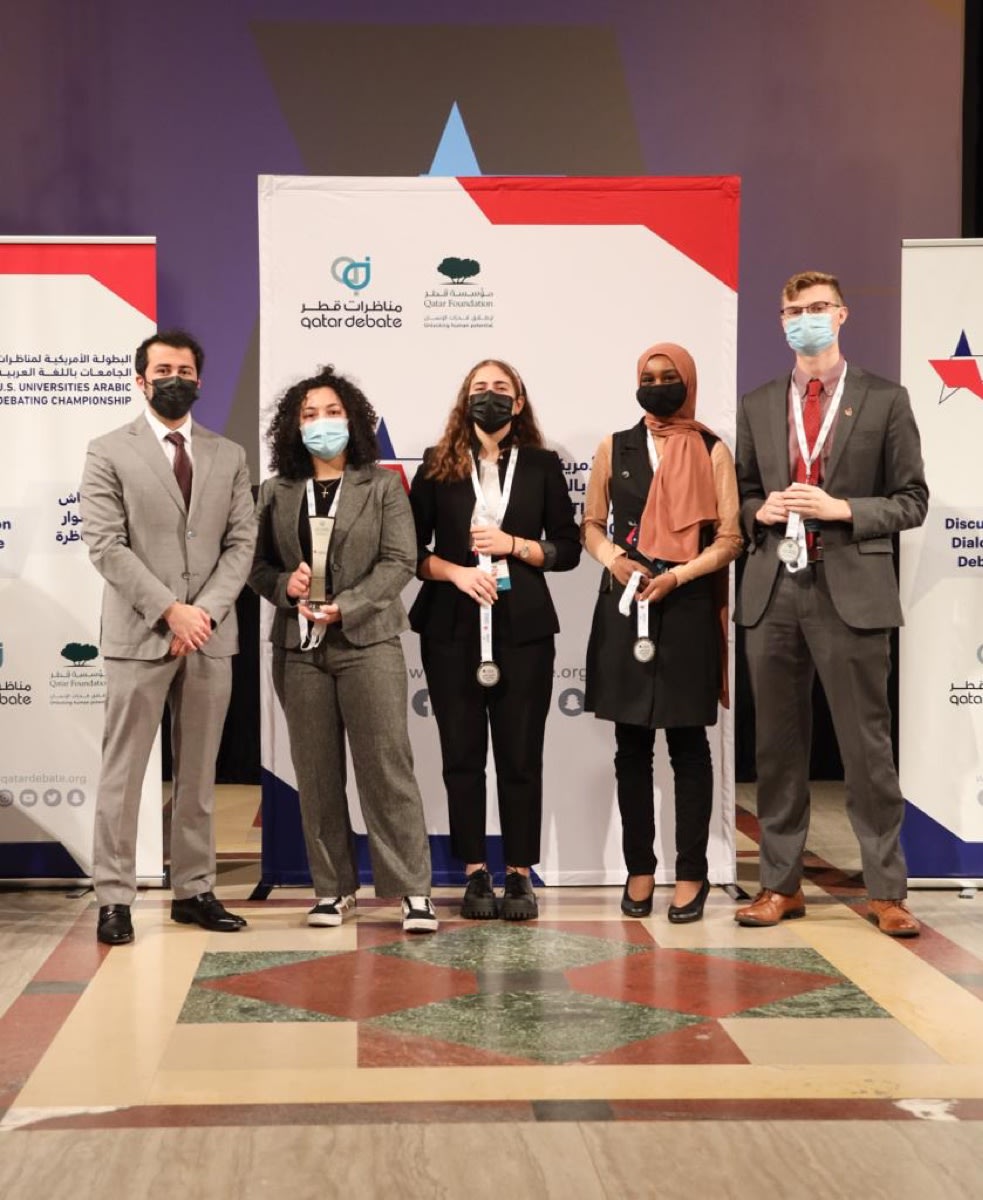
Caleb (right corner) along with his teammates receiving their second place medals at the 2nd US Universities Arabic Debating Championship.
What King finds most valuable about debating is that it allows him to actually put to use everything he studies in the classroom in a very practical manner. He said: “In classes, I read and I write and I speak but it’s in a fragmented manner, whereas debating requires that I do all of that together and accomplish something outside the classroom which is a unique opportunity when learning a second language in a country to which it is not native.”

